- Sermons
- /
- Friday Sermons
Constant vigilance of self is the greatest fruit of sawm:
Dear brother, we are about to perform the second great act or worship in Islam, which is sawm.
According to Imam al-Shafi’ee, may Allah have mercy on his soul, "Acts of worship are meant for the benefit of the creatures." Hence, the question to be asked is: What is the benefit we aspire to by fasting in the month of Ramadan? Allah Most High says:
"Hold fast to that which We have given you, and remember that which is therein"
These Words of Allah the Almighty, taken together with the previous ayah, urge us to apprehend the wisdom behind fasting in order to gain self-control and to inspect whether we are on the right path.
Are we fasting as Allah has ordered us to? With the passage of time sawm may turn into one of our habits, drifting away, in the process, from being an aspect of the Deen.
Namely, this month of worship may get turned into a month of keeping mixed company, consuming sophisticated foods and drinks, lack of tongue-watching, backbiting and calumny, as if it were a month of eating and drinking by which to break away from the very gist and reality of the Deen of Islam as clearly such habits, if adopted, empty our acts of worship of their substance.
Sawm grants certainty against doubts and shirk:
The most important question to be asked is: What does Allah expect from me by enjoining sawm during this month? What is the wisdom behind fasting in Ramadan? Allah Most High says:
"O you who believe! Observing As-Saum (the fasting) is prescribed for you as it was prescribed for those before you, that you may become Al-Muttaqun (the pious)"
Out there are lusts, doubts and misguiding concepts; there are also ways of thinking which lead to shirk, materialism and opportunism. Thus, we may encounter in our everyday life many contrasting perspectives, most of which are far away form Allah’s Method. Therefore, the wisdom behind sawm lies in abstaining from doubts by resorting to certainties –abstaining from shirk by resorting to tawheed, abstaining from wrongdoing by resorting to obedience and abstaining from doubts in the Divine Entity by getting acquainted with Allah.
"That you may become Al-Muttaqun (the pious)"
What is it, then, that man should abstain from? Obviously, from what is harmful, dangerous and devastating.
"O you who believe! Observing As-Saum (the fasting) is prescribed for you as it was prescribed for those before you, that you may become Al-Muttaqun (the pious)"
The right vision leads to the right movement:
Dear brother, if we were to analyze our movements in life, we ought to ask the following question: What is it that preceded our movement? Why, for example, did you pay your friend a visit? Actually, you begin with a thought or a vision which, if proved to be right, will lead to the right movement. If, on the other hand, it has proved to be wrong, your movement will be wrong as well.
By definition the human being is a mobile creature, but what motivates man to move? Basically, it is the need for food and drink which is considered as one of man's essential needs, the one that maintains his existence as an individual. What else motivates man to move? It is his need of the opposite sex, fulfilled through marriage in order to preserve the human race. Were it not for this desire, mankind would become extinct.
The necessity to surpass, to outdo, to feel self-esteem, or whatever you might call it, is another factor that keeps one’s remembrance on earth alive, and without which, no success would ever take place on earth.
Hence, eating in order to preserve our existence, longing for marriage in order to preserve our race and surpassing oneself in order to leave a legacy are the needs that keep one moving in life.
Dear brother, the desires mentioned above can be satisfied according to Allah’s Method, by which you will be extolled in the Sight of Allah. However, these desires can also be satisfied in ways which are twisted and which go against Allah’s Method, and this is what life is about.
Islamic Law recognizes your needs and when you fulfill them according to Allah’s Method, you will fall within the category of believers, and accordingly, you will be pious, sound in your worldly life, safe and tranquil; you will be protected and prosperous; defended by Allah.
Therefore, when you seek to fulfill your desires according to Allah’s Method, you will ask a woman to marry you when longing for her, you will invest in a legitimate project when longing for money and you will perform many a good deed when longing for self-esteem.
Man should be obedient in order to avoid wrongdoing:
Dear brother, O, you who believe:"O you who believe! Observing As-Saum (the fasting) is prescribed for you as it was prescribed 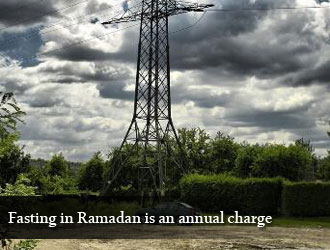 for those before you, that you may become Al-Muttaqun (the pious)"
for those before you, that you may become Al-Muttaqun (the pious)"
Thus, the idea here is to abstain from doubts by resorting to certainties, to abstain from Allah’s wrath by pleasing Him, from sins by resorting to obedience and from mistrusting Allah by putting your trust in Him as putting your trust in Allah is the price you pay for Paradise.
You resemble, in a way, the cellular phone as you need to be charged every now and then. In this sense, the five prayers charge you daily with the input lasting from one salah to the following one, whereas the Friday salah charges you from week to week as you listen to the khutbah with all its ayaat, ahadith, texts, examples, stories and sets of concepts that you are addressed with and through which you beef up your convictions, orientations, reverence and your obedience to Allah the Almighty. As for your annual charging, it lasts for thirty days during the noble month of Ramadan and it is considered as prolonged charging. Along the same line, hajj is considered as a life-time charging as the one who performs it will return home as he was on the very day his mother gave birth to him.
Sawm performed out of sincere faith grants forgiveness:
Here is a glad tiding for all of us. Suppose, by way of example, that you are in debt to the tune of thirty seven million dollars and accordingly, your house is impounded, you are a prisoner in your own house, a law suit and jail are your future, and you are indeed in hot water. What if someone told you that you will be free of these misfortunes provided you carry out a given task over the period of thirty days? What would you say in response? Would you hesitate even for one second to accept that offer and its repercussions? The same goes for Ramadan –a 30-day-long period of fast.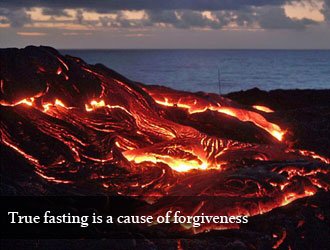
Sayyidina Said Ibn Abi Waqqas said something that I never tire of repeating, namely: ((In three things I consider myself to be a real man…)), and "man" here (as mentioned in the Qur'an) means "a hero" not "a male" as Allah Most High says:
"Men whom neither trade nor sale diverts them from the Remembrance of Allah (with heart and tongue)"
((In three things I consider myself to be a real man and in the rest I am just a common man)), one of them being: ((I never heard something from the Prophet, may Allah bless him and grant him peace, but I knew for sure that it was the truth revealed to Him from Allah the Almighty.))
And the Prophet, may Allah bless him and grant him peace, says:
((All the past sins will be forgiven of whoever observes fasts during the month of Ramadan out of sincere faith and hoping to attain Allah's rewards.))
You will be forgiven even if your sins reach the height of a mountain, provided you fast in this month exactly as Allah wants you to –fasting in obedience not while watching soap operas, fasting as an act of worship not a habit, fasting in piousness not in disobedience and fasting to approach Allah not to break away from Him.
((All the past sins will be forgiven of whoever observes fasts during the month of Ramadan out of sincere faith and hoping to attain Allah's rewards.))
"Nor does he speak of (his own) desire. It is only an Inspiration that is inspired."
And in another hadith:
((All the past sins of whoever performs salah by night during the month of Ramadan out of sincere faith and hoping to attain Allah's reward will be forgiven.))
Some scholars said: The highest level in reciting the Qur'an is to do so while standing in a mosque during salah. Here, the highest level means the level of the reward, and this refers to the salah taraweeh.
Therefore, Ramadan is the month of the Noble Qur'an, the month of forgiveness, the month of repentance, the month of reconciliation with Allah, the month of approaching Him, the month of night prayers and the month of fajr prayer.
((All the past sins will be forgiven of whoever observes fasts during the month of Ramadan out of sincere faith and hoping to attain Allah's rewards.))
Remembrance of Allah grants tranquility and safety:
Dear brother, salah according to Shafe’ee, may Allah have mercy on his soul, is an act of worship that is meant for the benefit of the creatures.
"And perform As-Salat (Iqamat-as-Salat). Verily, As-Salat (the prayer) prevents from Al-Fahsha' (i.e. great sins of every kind, unlawful sexual intercourse, etc.) and Al-Munkar (i.e. disbelief, polytheism, and every kind of evil wicked deed, etc.) and the remembering (praising, etc.) of (you by) Allah (in front of the angels) is greater indeed [than your remembering (praising, etc.) Allah in prayers, etc.]. And Allah knows what you do."
One of the most accurate things that Ibn Abbas said, may Allah be pleased with him, is: "Allah’s remembrance of you is greater than yours of Him since when you remember Him, you do that out of an obligatory act of worship; yet, when He remembers you, He will grant you security therewith."
"Therefore remember Me (by praying, glorifying, etc.). I will remember you"
"(So) which of the two parties has more right to be in security? If you but know." It is those who believe (in the Oneness of Allah and worship none but Him Alone) and confuse not their belief with Zulm (wrong i.e. by worshipping sh3er besides Allah), for them (only) there is security and they are the guided."
The word "only" in this ayah means that only the believer will obtain security from Allah:
"For them (only) there is security and they are the guided."
If you remember Allah, He will remember you in return, and by that He will grant you security, He will grant you satisfaction, He will grant you prosperity, He will grant you the blessing of guidance and protection:
((Be righteous and you will not be able to encompass everything.))
Therefore, Allah’s remembrance of you is greater than yours of Him, this is in respect of salah.
Obedience to Allah prevents His wrath:
As regards sawm Allah says:
"O you who believe! Observing As-Saum (the fasting) is prescribed for you as it was prescribed for those before you, that you may become Al-Muttaqun (the pious)"
That is, you abstain from doubts by resorting to certainties, you abstain from Allah’s wrath by pleasing Him, you abstain from Allah’s anger by resorting to His acceptance and you abstain from being far from Allah by drawing closer to Him.
What does the word muttaqun mean? It means that you abstain from all wrongdoing, from breaking away from Allah and from affliction.
"O you who believe! Observing As-Saum (the fasting) is prescribed for you as it was prescribed for those before you, that you may become Al-Muttaqun (the pious)"
This is in respect of sawm.
Zakat purifies the soul from stinginess:
In respect of zakat:
"Take Sadaqah (alms) from their wealth in order to purify them and sanctify them with it"
Allah is telling you here that this zakat will purify and sanctify you. What is there to be purified? It will purify the rich from stinginess. Believe me, stinginess is like an intractable and fatal disease as he who is affected with it turns into a fool, namely, he lives in poverty and dies wealthy.
A young man, who inherited considerable wealth after his father’s death but was not raised properly by him nor was he shown by him the path of Allah the Almighty was asked a few days after his father’s death about his plans. Excuse me, but I have to repeat what he said exactly, he said: I am going to drink a toast to the health of my father’s soul.
His father never bothered to rear him nor did he show him Allah’s Path. He left him money, only this, not knowledge.
It has been said: "O son! Knowledge is better than wealth as the former guards you whereas the latter has to be guarded, and money decreases by spending it whereas knowledge increases by teaching it. O son! The guardians of money are the living dead whereas the ulamah (knowledgeable people) will be eternal till the end of days; though their bodies are gone, their stories and knowledge live in people’s hearts."
I know a brother who lived more than one hundred years and who spent his entire life teaching the Qur'an. He said to me once: "I have eighty three grandchildren, most of whom are huffaz", (those who know the Qur'an by heart), as the believer is blessed and so is his family, sons, daughters, sons-in-law, daughters-in-law, and grandchildren.
This brother of mine got old in the company of his wife; they enjoy being with their sons and their wives, their daughters and their husbands, not to mention the eighty three grandchildren, most of whom are huffaz.
Dear brother:
"Take Sadaqah (alms) from their wealth in order to purify them and sanctify them with it"
The rich are purified from stinginess, whereas the poor are purified from envy, and "mal", money (meaning "inclining towards" in Arabic) implies that other’s rights are included within it.
'And sanctify them with it"
Zakat enriches the wealthy man’s soul as he watches the smile on the faces of those whom he has helped, whose feelings he has soothed and whose hearts he has eased. Zakat purifies also the poor man's soul, namely, it makes him realize how much the society cares for him. Furthermore, it purifies the money itself from all the rights sh3er have on it. Therefore, zakat makes the wealth as well as the souls of the poor and the rich thrive:
"Take Sadaqah (alms) from their wealth in order to purify them and sanctify them with it"
Hajj is meant for you to know that Allah knows:
Dear brother, in respect of hajj there is a very delicate ayah in which Allah Most High says:
"That you may know that Allah has knowledge"
When you know beyond doubt that Allah knows, then all your problems are solved. When you know that Allah knows, you can’t disobey Him, you can’t break away from Him, you can’t be mean to His creatures, you can’t eat ill-gotten money and you can’t commit wrongdoing.
Therefore, hajj is meant for you to get to know that Allah knows; zakat is meant to be paid in order to purify and sanctify the poor, the rich and the money; and salah is meant to be the remembrance of Allah as through it you remember Him and He remembers you:
"Therefore remember Me (by praying, glorifying, etc.). I will remember you"
Upon remembering you, Allah will grant you security, satisfaction, happiness, dutiful wife, pious children, good reputation and clear consciousness. Allah says:
"He will guide them and set right their state."
Allah has bestowed uncountable graces upon you, therefore, memorize the following hadith and hang it on a wall in your house:
((Be righteous and you will not be able to encompass everything.))
Which means: You will not be able to count the blessings received on account of your righteousness.
Sawm is an act of worship out of sincerity:
Dear brother, sawm is worshiping out of sincerity. One might come to doubt one's sincerity. However, when one fasts on hot days like the ones we have in summer, when the temperature reaches forty four or forty five degrees, and one enters one's house at high noon burning with thirst; the refrigerator is there, cold water is an open invitation to drink and no one is watching, what exactly hinders one from putting a few drops of water into one's mouth? Yet, one simply can’t. This is why sawm is considered to be an act of worship out of sincerity.
Let me give another example here. When a father gives his son a series of instructions, such as to brush his teeth, do his homework and the like, he will be giving orders which are clear and understandable to the son as the latter realizes that all these instructions are for his own good; but when the father asks him not to eat the delicious halal food that is on the table, this instruction is not clear nor is it understandable to the son given the fact that the father himself is eating of that food. Yet, this son says: Whatever you say, I shall obey. What exactly can be said about this son? This son, judging by his stance, has full trust in his father and is fully prepared to obey this incomprehensible order of his.
Much in the same line, Allah prevents you from fornication, drinking wine, stealing and lying (which are orders for your benefit). Later on, He asks you not to eat or drink for more than eighteen hours, not even a bite or a drop of water (which is an order incomprehensible to you), yet, you obey Him. This is how this act of worship tests your sincerity. Having obeyed Allah, you offer your evidence-based proof that you believe in Him, you fear Him, and you know beyond doubt that He is watching you even when you are alone in your house.
Sawm, thus, is an act of worship out of sincerity through which Allah prevents you from the permissible. This, precisely, is its great challenge –the fact that in Ramadan you are prevented from the permissible. Hence, the prohibition of the impermissible comes to be even more understandable.
Is it rational to refrain from eating and drinking for the sake of Allah and then lie, backbite or cheat? Impossible! Allah puts you in a critical situation as He prevents you from the things which are vital for everybody, namely food and drink. He asks you to stop eating and drinking even when it is baking hot. If such is the case, if you have obeyed Him by refraining from halal things, is it rational after that not to obey Him by not refraining from haram things and wrongdoing? That is absolutely impossible. That is why sawm strengthens our will to obey Allah. Refraining from the permissible will make you refrain from the impermissible, and this is the exact meaning of the following hadith sahih from the Prophet, may Allah bless him and grant him peace:
((All acts done by the son of Adam are meant for him, except fasting. It is exclusively meant for Me and I (alone) will reward him for it.))
The salah is for him, truthfulness is for him, faithfulness is for him, obedience is for him, and righteousness is for him as well:
((All acts done by the son of Adam are meant for him, except fasting. It is exclusively meant for Me, and I (alone) will reward him for it.))
Sawm is submissiveness to Allah’s Will.
By the way, dear brother, whenever the wisdom behind any act of worship is clear to you and you perform it, you will be rewarded for that. However, when the wisdom of an act of worship is concealed from you and you still perform it, then your reward will be doubled. Namely, when you refrain from food and drink, you may be unable to convince a non-Muslim of the reason behind it as he will say to you that this is something beyond his ability, and why can't he eat or drink? But the Muslim has a marvelous secret which is submissiveness to Allah’s Method, something a non-Muslim lacks.
((All acts done by the son of Adam are meant for him, except fasting. It is exclusively meant for Me, and I (alone) will reward him for it.))
Lowering gaze should be all year long and particularly in Ramadan:
Dear brother, lowering gaze is one of the required things that should be put into practice all year round and even more so in the month of Ramadan. Allah says:
"Tell the believing men to lower their gaze (from looking at forbidden things)"
Suppose that you are sitting at home in a dark room and in the building across the street a woman comes out to the balcony dressed in revealing clothes, so that you can feast your eyes on her beauty. Is anyone on earth in a position to hold you responsible for such an act? Impossible! Yet, Allah Most High says:
"Allah knows the fraud of the eyes, and all that the breasts conceal."
Thus, it is only Allah who knows the fraud of the eyes and all that the breasts conceal.
Dear brother, in brief, Ramadan is a crash course by which you can be freed from Hellfire, you can be forgiven for all your sins. Better yet, you can win Allah’s Pleasure. However, there is one condition to attain all that, which is to fast as an act of worship not as one of your habits.
Ramadan is the time of sharing between the rich and the poor:
One more thing, the rich actually don't get the taste of hunger outside Ramadan as every delicious food and drink is available to them at all times, but in Ramadan they go hungry out of their free will, unlike the poor who experience hunger against their will. Accordingly, Ramadan will be the time of sharing between the poor and the rich. It is as if Allah wanted us to experience the state of the poor when they are hungry instead of having this as an idea as there is a huge difference between saying that so-and-so has given one hundred lashes and between saying that so-and-so has been given one hundred lashes. The concept is easy but experiencing it is very hard. Therefore, in the month of Ramadan, Allah wants us to taste the distresses of the poor, hunger being at the top of the list.
Whoever has enough food for one day has to pay zakat al-fitr:
Apart from zakat, which is an act of worship performed by the rich, in Ramadan Allah the Almighty has enjoined on us zakat al-fitr. Whoever can eat one meal daily is commanded to pay it.
Why is it so? Allah the Almighty has meant for the poor to taste paying zakat once a year and at the 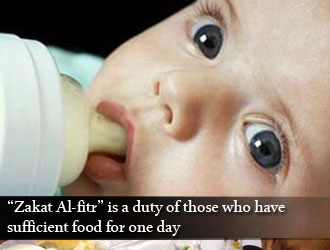 same time He has meant for the rich to taste hunger once a year. Sawm will not reach
same time He has meant for the rich to taste hunger once a year. Sawm will not reach
Allah until zakat al-fitr is paid. Dear brother, again:
((All the past sins of whoever observes fasts during the month of Ramadan out of sincere faith and hoping to attain Allah's rewards will be forgiven.))
((All the past sins of whoever performs salah by night during the month of Ramadan out of sincere faith and hoping to attain Allah's rewards will be forgiven.))
I say this and ask Allah’s forgiveness for me and you, as the true success lies in obtaining Allah’s forgiveness, so I ask for His forgiveness.
* * *
Second khutbah:
Praise be to Allah, the Lord of the Worlds and may He bless and grant peace to Muhammad, the Faithful and the Honest, and may Allah bless his family and companions.
Whoever fasted in Ramadan and was not forgiven is doomed:
Dear brother, on one occasion the Prophet, may Allah bless him and grant him peace, was climbing the minbar (pulpit) and after having ascended one step, he said "Ameen". Then he ascended the second step and said "Ameen" and he ascended the third step and said "Ameen". After he has descended, his companions said: "O Messenger of Allah! We heard something from you that we have never heard before. He said:
"Jibril visited me and said"- pay attention to this important hadith- "The one who witnesses Ramadan and is not forgiven is in a great loss. If he was not forgiven in Ramadan, then when would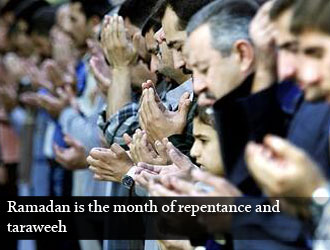 that happen?"
that happen?"
Ramadan is the month of repentance, fasting, taraweeh, and praying fajr in the mosque. Hence, may Allah curse him who performs Ramadan and is not forgiven. If he is not forgiven in Ramadan, then when is that going to happen? This is the month of drawing closer to Allah, the month of repentance, of salah, of love, of the Qur'an, and it is the month of worship. By Allah, it is more than necessary to give up all the habits people have grown accustomed to in their parties and banquets every day of Ramadan, postpone them till after Ramadan, hold these meetings after Ramadan and spend this month exclusively in worship. Pray maghrib (sunset prayer), then eat moderately and get ready for the prayer of taraweeh, in which you should try to connect with Allah.
Most people worship Allah and get righteous in Ramadan but when it is over, they go back to their usual ways; then another Ramadan comes and thus they spend their lives in ups and downs without benefiting from their fast in any way.
If you imagine Ramadan as stairs which lead up towards achievements, you can easily perceive that to reach the top you should keep ascending, but when you go up and down, you will never reach the top. Therefore, you should keep climbing and this is the gist of Ramadan, it is what Allah has meant it to be –a quality leap that you maintain the rest of the year till the next Ramadan. You perform the fajr salah in the mosque for thirty days in Ramadan and keep that habit after Ramadan, and the same goes for the isha’a salat, because the Prophet, may Allah bless him and grant him peace, said:
((He, who performs salat al-fajr (the dawn prayer) in community, is under Allah’s Care (and Protection) till sunset, and he who performs salat al-isha’a in community is under Allah’s Care (and Protection till dawn.))
((He who performs salat al-fajr (the dawn prayer) is under the Care (and Protection) of Allah the Almighty.))
((He who performs salat al-isha’a in community will be like he who has stayed half of the night performing night salah.))
When you perform fajr and isha’a salah in community, you will be protected the entire day (in the night and the morning of it) by Allah.
The Prophet’s instructions on health are nothing but Revelation:
One more thing –the Prophet, may Allah bless him and grant him peace, used to eat three dates before breaking his fast at sunset, and then he used to pray maghrib salah, and after that he would eat. The amazing thing is that the sugar found in dates is the fastest carbohydrate to move from the mouth to the blood as it takes only ten minutes to do so. Therefore, after having eaten three dates you will have enough sugar in your blood to inform the brain that it should make you feel full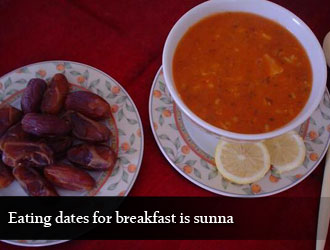 and this will lead you to eating moderately. When does man feel full? This happens in two cases, one of which (the worst one) is when his stomach is literally full as it stimulates the satiety center in the brain; and the second case is the one just mentioned, when the sugar contained in those three dates reaches the satiety center in the brain and this leads to a kind of satisfaction and, accordingly, you will eat your futoor (fast breaking meal) as if you were eating your mid-day meal any day outside Ramadan.
and this will lead you to eating moderately. When does man feel full? This happens in two cases, one of which (the worst one) is when his stomach is literally full as it stimulates the satiety center in the brain; and the second case is the one just mentioned, when the sugar contained in those three dates reaches the satiety center in the brain and this leads to a kind of satisfaction and, accordingly, you will eat your futoor (fast breaking meal) as if you were eating your mid-day meal any day outside Ramadan.In many countries I have visited fruit is eaten before meals, Brazil for example, and it is considered something proper and in fact it is the right thing to do. The proof of it is in the following ayah:
"And fruit; that they may choose. And the flesh of fowls that they desire."
Try to make it a habit of yours and instead of eating an apple after your meal, eat it before and you will feel more comfortable as you won’t be very hungry when you start eating your meal, and that is because the brain satiety center is stimulated by fructose which is the fastest carbohydrate to be assimilated by blood. It takes about ten minutes to reach blood, then brain and stimulate it accordingly. Who told the Prophet, may Allah bless him and grant him peace, about it?
"Nor does he speak of (his own) desire. It is only an Inspiration that is inspired."
Hence, all the Prophet’s instructions in respect of health are not according to his own judgment or the knowledge prevailing in his lifetime, but:
"Nor does he speak of (his own) desire. It is only an Inspiration that is inspired."
Accustom yourself, all year long, to eating a piece of fruit before meals; try doing it and try to be moderate, that is, stop eating before you feel full.
Supplication:
We beseech you Allah to show us the way of rightness, together with those to whom You have showed it; and give us good health, together with those whom You have healed; and be our Protector, together with those for whom You have become their Protector; and bless us in what You have bestowed on us and save us from the afflictions that You have decreed, for You rule with justice and You are never judged. He whom You protect shall never be humiliated and he whom You make enemy shall never be exalted. Blessed and dignified are You, and we thank You for what You have decreed.
We seek your forgiveness and we repent our bad deeds. O Allah! Guide us to performing good deeds in order to draw closer to You!
O Allah! Give us and don’t withdraw from us, dignify us and don’t humiliate us, choose us and don’t turn away from us, please us and be pleased with us!
O Allah! Scatter our enemies, disperse their unity, sow dissension among them, and let their plotting backfire upon them, O Lord of the Worlds!
O Allah! Show us Your might by destroying them as you show us their power by destroying us. O Lord of Worlds, you are the All-Hearing, the Close One and the One who Answers Supplications.

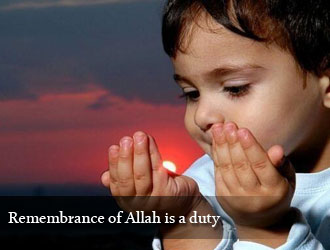 Hence, Allah’s remembrance of you is greater than yours of Him, as when you remember Him, you do that out of an obligatory act of worship; yet when He remembers you, He will grant you security therewith:
Hence, Allah’s remembrance of you is greater than yours of Him, as when you remember Him, you do that out of an obligatory act of worship; yet when He remembers you, He will grant you security therewith:








